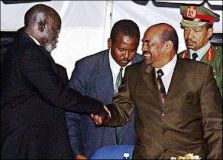Sudan’s Beshir: soldier turned Islamist turned peace-maker
KHARTOUM, Jan 1 (AFP) — Sudanese President Omar al-Beshir has surprised even some of his staunchest critics by negotiating and signing the broad outlines of a peace agreement with the southern rebel movement he had pledged to destroy.

|
|
Sudanese President Omar El Bashir (R) shakes hands with the leader of Sudan’s People Liberation Movement/Army John Garang after the signing of accords on two outstanding issues paving the way for the signing of a comprehensive peace deal. (AFP) . |
“I will deal with him soldier to soldier,” Brigadier Omar Hassan al-Beshir, said shortly after seizing power in a military coup in 1989, in reference to Colonel John Garang, leader of the Sudan Peoples’ Liberation Movement.
The comment triggered a burst of aggression between Beshir’s and Garang’s forces that led to an escalation of the civil war between the predominantly Arab and Muslim north and the animist and Christian south.
But the government of Beshir and Garang’s rebel SPLM on Friday signed accords on two outstanding issues, paving the way for the signing of a comprehensive peace deal to end Africa’s longest-running conflict.
Born in 1944 into a rural family in Hoshe Bannaga, some 100 kilometers (62 miles) north of Khartoum, Beshir had a fascination with the military at an early stage.
In 1988, at the height of the civil war between the Khartoum government and rebels of the Sudan Peoples’ Liberation Movement, he was appointed commander of the eighth brigade, stationed in the South at the time.
The posting brought him face-to-face with the conflict and came at at a time when there was great dissatisfaction in the military, particularly the officer corps, with the government of then Prime Minister Sadiq al-Mahdi.
SPLM forces captured town after town, as the military complained about being poorly-equipped, plunging morale to its lowest in years.
In early 1989, disgruntled officers encouraged Defense Minister, Abdul Majid Hamid Khalil, to present a memorandum to Premier Madhi with a list of demands. It read like an ultimatum and he rejected them outright, prompting Khalil’s resignation.
And on June 30, Beshir, backed by the National Islamic Front party of Hassan al-Turabi, toppled Mahdi’s three-year-old democratically-elected government in a bloodless coup.
He declared a nationwide state of emergency, suspended the constitution, dismissed parliament and disbanded all political parties, branding then “sectarian organizations.”
Turabi became the regime’s chief ideologue and together with Beshir, they introduced the country to a more radical brand of Islam, further alienating southerners and many northern Muslim politicians.
Together, they established the Islamist Popular Defense Forces, which was deployed in the south to fight a Jihad or holy war against the “infidels”, raising the stakes in the civil war.
They ruled through the Revolutionary Command Council (RCC) and the National Salvation government, staffed with junior military officers — Beshir purged nearly all senior officers from the military, even executing a few.
In 1993, he dissolved the RCC and declared himself president of the republic, concentrating power in his own hands.
Three years later, in 1996, he organized the presidential and parliamentary election that his party, the National Congress Party, won by a majority.
His mentor, Turabi, become speaker of the National Assembly (parliament) and in 1999, a new constitution that paved the way for the creation of “political associations” and a limited multi-party system, was passed.
Later that year, Beshir had a fallout with Turabi in power-struggle, which saw the once powerful Turabi relegated to the fringes and Beshir make a break from radical Islam, as he set about repairing damaged relations with neighboring countries and the rest of the world.
Turbai’s continuing sabre rattling on the sides led Beshir to throw him in jail in Febuary 2001 and give him the final heave-ho, using a memorandum of understanding Turabi’s Popular Congress party signed with the SPLM as a legitimate excuse for the move.
He was released in 2003 and rearrested the following year for his alleged involvement in a coup plot supported by rebels from the western region of Darfur.
Should the parties deliver on their pledge to sign a final peace agreement on January 9 in Nairobi, Kenya, ending the 22-year civil war, Beshir will have more than a thing in common with former president Gaafar Nimeiry.
Both leaders used others to stage military coups, communists in the case of Nimeiry and Islamists in Beshir’s.
They would be two leaders who seized power through the gun barrel, but yet managed to be the only ones to sign comprehensive peace agreements with southern rebels: Nimeiry in 1972 and Beshir in 2005.
